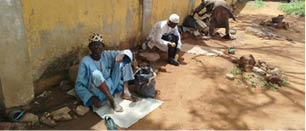“For me begging is necessary in order to feed myself. I lost my wife about nine years ago and my only child has travelled to Lagos, in search of a menial job. I do not have anyone to take care of me.
“I have been lonely all these years because I do not have money to marry another wife. So, if I stay at home, no one will give me food to eat. That is why I came to Sokoto city, and engaged in street begging, at least to feed myself”.
This is the testimony of a 67-year old beggar, Malam Dauda Isma’il, who travelled from Wamakko Local Government Area of Sokoto, to the state metropolis for the purpose of begging.
Isma’il is one out of hundreds of persons in the state metropolis that rely on street begging for their livelihood. It is a common sight in Sokoto metropolis to see such beggars seeking alms around public places such as markets, motor parks, shopping malls, petrol stations, mosques, among many others.
- North is a victim of itself; solutions to its challenges lie within – Wazirin Katsina
- The home and missing education
A chunk of these beggars have their permanent joints at various locations in the metropolis, including the Hubbaren Shehu; the thumb of the famous Islamic scholar, Shehu Usmanu Danfodio, where people from far and near visit.
Findings showed that street begging in Sokoto has no age or gender barrier, as women, men, young, old, abled and disabled, as well as married and unmarried persons are engaging in it.
Also, they have no specific time for begging in the state; they could be seen begging in the morning, evening, night and under the sun or rain. While the elderly among the beggars have permanent places, where they stay from morning to evening, the women are usually seen roaming the streets from one place to another, seeking alms.
The minors among the beggars specialise in house-to-house begging. This group of beggars could be seen holding plastic bowls, moving from one house to another asking for food to eat.
According to Dr. Umar Muhammad Jabbi, a senior lecturer in the Department of History, Usmanu Danfodio University Sokoto, street begging, especially among pupils of Qur’anic schools can be traced to the 70s, when the country witnessed severe hunger.
Dr. Jabbi recalled that prior to the 70s hunger incident; there was no issue of begging among the students of Qur’anic schools in the northern part of the country.
“In those days, the disciples of the Qur’anic schools were mostly youths, who relied on handcrafts for livelihood. They were not begging at all. But after the hunger disaster, parents began to send their children to Qur’anic schools in order to have some respite. Later, the teachers also started sending these children out for begging, because the burden was too heavy on them. Even at this point, the baggers are all about getting food to eat, not money or its supplement. This is how the pupils of Qur’anic schools got engaged in begging,” he said.
The historian, however, said the situation was aggravated after the introduction of the federal government’s policy: Structural Adjustment Program (SAP). He lamented that the program worsened the nation’s economy, thereby inflicted serious poverty on Nigerians, hence, many people went into begging.
“Street begging is worse in Sokoto, with all manner of people; women, men, young persons and even children and elderly people engaged in it. Unfortunately, some beggars now consider the act as a business,” he said.
Malam Abdullahi Muhammad is a beggar and leader in one of the beggars’ joints along Sama road in the state metropolis. He told Weekend Trust that he has been begging at the spot for the past 20 years, adding, “I usually spend a week or two in Sokoto and then go back to my home town, Dange in Dange/Shuni Local Government Area to see my family.
”We usually come to this spot in the morning and stay here till around 2pm, then move to Kano road and continue begging till 7pm. We normally close for the day at 7pm and go back to the Sultan Abubakar lll Juma’at mosque popularly known as Masallaci na uku to spend the night.
Another bagger, Malam Adamu Lauwali, who came to Sokoto from the neighboring Zamfara State, said they were begging to take care of their families. A father of seven, Lauwali explained that whatever they gather through begging, they take to their families in Zamfara State.
“People bring alms to us in cash and kind. Some people donate money to us while others give us foodstuffs or second hand clothes. Whatever we get, we take to our families. Of course, sometimes we get, sometimes we don’t, such is life,” he said.
On his part, Malam Auwalu Ya’u said, “As you can see, I am a leper and I am on drugs. I cannot work on my own, so I must beg to get some money to feed myself and buy drugs. I also need money to take care of my family. My family is in Amanawa. I did not come with them because I don’t have an accommodation in the city. Most of us lepers are on drugs due to our illness”.

Also, Malam Isyaku Ibrahim, another beggar from Raba Local Government Area of Sokoto State, said, “As you can see, I cannot work because of my health condition, therefore, the only way I can survive is to beg and get money. We are into begging against our wishes. If not because of our condition, we will not engage in begging.”
Weekend Trust observed that banditry is one of the factors fueling street begging in Sokoto. Residents of several villages and towns sacked by the bandits have moved to the state metropolis and are engaged in begging for survival.
The influx of the internally displaced persons into the city is in addition to the existing baggers that came from other local governments of the state and the neighboring states in search of Qur’anic knowledge.
No solution in sight
Street begging in Sokoto, Weekend Trust learnt, has defied several efforts by successive governments of the states to address the menace. For instance, the Senator Aliyu Magatakarda Wamakko-led administration conceived and implemented the Almajiri Integrated Schools Initiative, with a view to tackling the problem.
Under the initiative, Senator Wamakko built Tsangaya boarding schools in the three senatorial zones of the state and ordered the enrolment of Almajiri pupils, with a view to preventing them from street begging. The government shouldered the burden of their feeding, provision of teachers and learning and teaching materials. It is the same initiative the President Goodluck Ebele Jonathan-led administration borrowed and implemented at the federal level.
In addition to the integrated schools, Wamakko introduced a N6,500 monthly stipend for all adult beggars in the state and the two programmes ran concurrently throughout the eight-year tenure of Senator Wamakko.
Wamakko’s successor, Aminu Waziri Tambuwal continued with the two programmes for some time before he abandoned them half way into his first tenure as governor of the state. Although, the Almajiri Integrated Schools are still functioning, they are not enjoying the blessing of the state government, as they did in the past.
Alaramma Musa Ibrahim Yabo, one of the Qur’anic schools teachers in the state told Weekend Trust that although the Almajiri Integrated Schools initiative was a good one, lack of political will by the successive governments after Wamakko, killed the programme.
“The bulk of the blame for the failure of this programme is on the government. If the government can sustain hundreds of Western schools, I see no reason why it cannot sustain the schools under this initiative. I have about 200 pupils whom I am taking care of in my school. So, even if the government will not accommodate them in a boarding school, something must be done to alleviate their suffering. Government should provide them with at least shelter, foodstuffs and other basic needs such as drugs, soap and detergent. This will help in minimising if not eradicating street begging in the state,” he said.
Also, Dr. Umar Muhammad Jabbi of the Department of History, Usmanu Danfodio University Sokoto, lamented that although government at both federal and state levels introduced some programmes aimed at addressing street begging, the initiatives are not enjoying the expected support.
“The street begging phenomenon is a social problem that affects everyone, therefore, it needs a holistic approach to address it. Our wealthy individuals should start funding foundations to address this problem. We also need serious political will from the governments at all levels.
“Government should also introduce stiffer punishment for any teacher or parent that violates the laid down rules and regulations for operating Quar’anic schools. Movement of Almajiri pupils from one place to another should be stopped completely. All of them should be retained in their states of origin.
“Federal, state and local governments should devise means of supporting Qur’anic schools to run smoothly. Structures, food items, learning and teaching materials should be provided to such schools by the governments like they provide to Western schools. Government should also embark on a rigorous public awareness campaigns on how individuals and groups can support it to address this phenomenon,” he said.
The state’s Commissioner for Religious Affairs, Dr. Jabir Sani Mai Hulla, told Weekend Trust that the present administration will continue with the Almajiri Integrated School initiative and that it will continue to pay the N6,500 monthly stipend as part of its efforts to tackle street begging.
“The Sokoto State government is also in talks with the National Commission for Almajiri Education and Out-of-School Children, on how to address street begging in the state. The state government is equally collaborating with the Federal Ministry of Education on this matter. The Minister of State for Education visited Sokoto and met with relevant stakeholders on the issue. Presently, we are awaiting responses from the Federal Ministry of Education and Almajiri Commission.
“Again, the Sokoto State government has sent a bill to the state House of Assembly, seeking integration of Qur’anic/Tsangaya schools into the Arabic and Islamic Studies Board. This will enable the government to have total control over the Qur’anic schools and the institutions will also benefit from the goodies being extended to Arabic and Islamic schools by the government”, he said.
The commissioner added that the office of the wife of the governor will come up with an initiative that would help in curbing the menace.
Asked why street begging has defied government’s interventions, Dr. Mai Hulla said, “This might not be unconnected to the situation in the state. First, the issue of banditry; banditry contributes to the movement of people from other local governments and neighboring states to the state capital.
“From a census we conducted in the state metropolis recently, we have discovered sources of street beggars in the state; one source; are people coming in from refugee camps, another is the Qur’anic schools and, we also discovered one woman, who is bringing the Almajiri pupils into the city from villages for the purpose of begging. So, 50 per cent of the street beggars in the state are from the refugee camps and this is as a result of banditry. Therefore, the insecurity being the leading factor carries 60 per cent of the blame.
“Next to insecurity, is government’s inability to put in place necessary and effective measures that will tackle the problem. No matter what measures the Sokoto State government puts in place if the neighboring states of Katsina, Niger, Kebbi and Zamfara, do not take similar measures against the phenomenon, Sokoto will not achieve anything because the Almajiri from these states will troop to Sokoto for a better life.
“Unless northern governors stop the movement of Almajiri from one state to another and then put necessary measures in place to take good care of them in their states of origins, no state in this part of the country can succeed in handling this issue. This is a problem that needs collaboration and commitment from all the northern states and federal government if we really want to address it once and for all.”


 Join Daily Trust WhatsApp Community For Quick Access To News and Happenings Around You.
Join Daily Trust WhatsApp Community For Quick Access To News and Happenings Around You.


